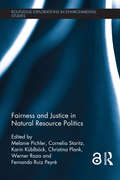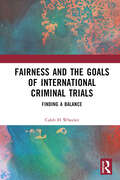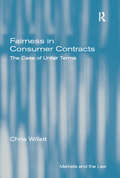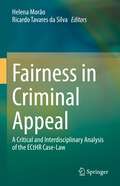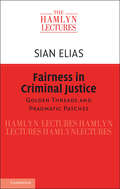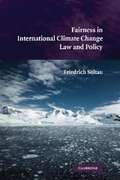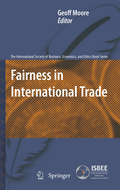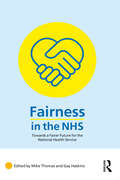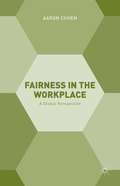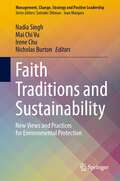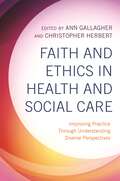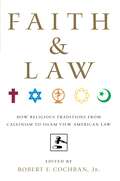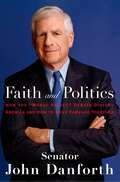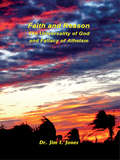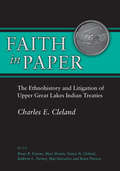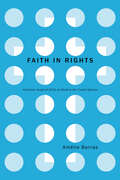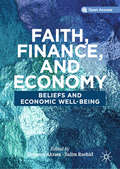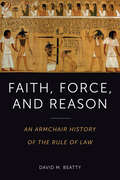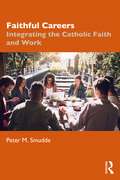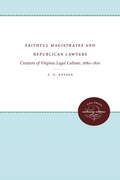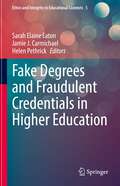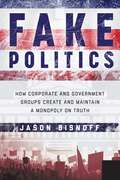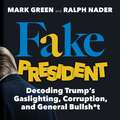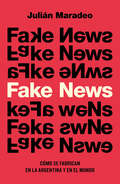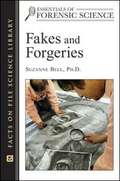- Table View
- List View
Fairness and Justice in Natural Resource Politics (Routledge Explorations in Environmental Studies)
by Cornelia Staritz Melanie Pichler Karin Küblböck Christina Plank Werner Raza Fernando Ruiz PeyréAs demand for natural resources increases due to the rise in world population and living standards, conflicts over their access and control are becoming more prevalent. This book critically assesses different approaches to and conceptualizations of resource fairness and justice and applies them to the analysis of resource conflicts. Approaches addressed include cosmopolitan liberalism, political economy and political ecology. These are applied at various scales (local, national, international) and to initiatives and instruments in public and private resource governance, such as corporate social responsibility instruments, certification schemes, international law and commodity markets. In doing so, the contributions contrast existing approaches to fairness and justice and extend them by taking into account the interplay between political scales, regions, resources, and power structures in "glocalized" resource politics. Various case studies are included concerning agriculture, agrofuels, land grabbing, water resources, mining and biodiversity. The volume adds to the academic and policy debate by bringing together a variety of disciplines and perspectives in order to advance both a research and policy agenda that puts notions of resource fairness and justice center-stage.
Fairness and the Goals of International Criminal Trials: Finding a Balance
by Caleb H WheelerThis book presents a ground-breaking, interdisciplinary study into the various goals assigned to international criminal trials. It starts from the proposition that no hierarchy exists amongst the different goals meaning that trials should strive to achieve all of them in equal measure. This is made difficult by the fact that not all of these goals are compatible and the fulfilment of one may lead to others going unmet. Therefore, a balance must be found if the goals of trial are to be achieved at all. The book posits that fairness should serve as the guiding principle when weighing the different trial goals against one another. It is argued that without fairness international and internationalised criminal courts and tribunals lack legitimacy and without legitimacy they lack effectiveness. The book concludes that international criminal trials must adopt procedures that emphasise fairness to all of the parties and trial participants if they wish to accomplish any of the goals set for them. Each chapter is devoted to identifying and explaining a different trial goal, providing analysis of how that particular goal functions in conjunction with the other goals, and discussing the ways in which a fairness oriented trial model will help achieve those goals. The book provides a dynamic understanding of the different trial goals and the importance of fairness in the trial process by drawing on research from a variety of different legal disciplines while also incorporating scholarship rooted in criminology, political theory, international relations, and psychology. The book will be essential reading for researchers, academics and professionals working in the areas of International Criminal Law, Public International Law and Transitional Justice.
Fairness in Consumer Contracts: The Case of Unfair Terms (Markets and the Law)
by Chris WillettThis book focuses on unfair contract terms in consumer contracts, in particular the existing legislation and the proposals by the Law Commissions for a new unified regime. In this context it considers, in particular, what we mean by fairness (both procedurally and in substance); the tools used; the European dimension; the move from general principles from the more piecemeal approach typical in UK legal tradition; and the further move in this direction as a result of the Unfair Commercial Practices Directive.
Fairness in Criminal Appeal: A Critical and Interdisciplinary Analysis of the ECtHR Case-Law
by Helena Morão Ricardo Tavares da SilvaThis book addresses the European Court of Human Rights’ fairness standards in criminal appeal, filling a gap in this less researched area of studies. Based on a fair trial immediacy requirement, the Court has found several violations of Article 6 of the European Convention on Human Rights at the appellate level by at least eighteen States of the Council of Europe in a vast array of cases, particularly in contexts of first instance acquittals overturning and of sentences increasing on appeal.On the one hand, the book critically engages this case-law with the law revisions it has recently inspired in European countries, as well as with the critiques and difficulties that it continues to raise. On the other hand, it interweaves insight from criminal procedure theory with new discoveries in the field of cognitive sciences (neuroscience of memory, philosophy of knowledge, AI), shedding an interdisciplinary light on the (in)adequacy and limits of the Strasbourg Court’s jurisprudence.
Fairness in Criminal Justice: Golden Threads and Pragmatic Patches (The Hamlyn Lectures)
by Sian EliasBritish criminal justice is a principal legacy of Empire in the common law world. It attempts fairness between prosecutors and accused in an accusatory system for establishing criminal responsibility supervised by a judge who is conspicuously detached from the fray. Fundamental features, today recognised as human rights, include the presumption of innocence and onus of proof, the privilege against self-incrimination, and the right to legal advice and representation. In these lectures, Dame Sian Elias examines modern challenges to this conception of criminal justice prompted by anxiety about crime and the costs and delays in proof of guilt. They include enlarged prosecutorial discretion in charging, incentivisation of early guilty pleas, adoption of reverse onuses of proof, application to criminal proceedings of principles of modern civil case management, and measures to bring the victim into the criminal justice system. The lectures question whether this repositioning risks the integrity of the system.
Fairness in International Climate Change Law and Policy
by Friedrich SoltauThis work analyses fairness and equity dimensions of the climate regime. A central issue in international law and policy is how countries of the world should allocate the burden of addressing global climate change. With the link between human activities and climate change clearly established, and the first impacts of climate change being felt, there is a renewed sense of urgency in addressing the problem. Based on an overview of science and the development of the climate regime to date, this book seeks to identify the elements of a working consensus on fairness principles that could be used to solve the hitherto intractable problem of assigning responsibility for combating climate change. The book demonstrates how an analysis of fairness dimensions of climate change - grounded in practical developments and illustrated with reference to the latest developments - can add value to our understanding of current developments and future options for international climate law and policy.
Fairness in International Trade
by Geoff MooreThis book arises out of papers delivered at the World Congress of the International Society of Business, Economics and Ethics (ISBEE) held in Cape Town in 2008. There are two sections. First, a number of key papers provide an insight into global business, wealth creation and welfare issues with particular reference to the African continent - appropriate for a Congress that was based in South Africa and drew wide participation from African scholars. Second, it provides the output from a global research project on "Fairness in International Trade" which ran over the two years prior to the Congress. This project drew together the work of scholars in five regions across the globe and is the first time that such a global perspective has been attempted. This book is aimed at academics working in the area of international trade or development economics particularly those who have an interest in the ethical dimensions of trade. It will also be of interest to students of development economics and business ethics particularly at Masters and Doctoral level.
Fairness in the NHS: Towards a Fairer Future for the National Health Service
by Mike Thomas Gay HaskinsThis book is for everyone who is concerned about the successful future of a very special institution – the National Health Service (NHS). It provides the reader with an overview of the complexity of healthcare delivery, and the crucial influence that fairness should have on healthcare planning. The National Health Service Act was approved by Clement Attlee’s Labour Government on 5 July 1948. It was created in a great post-war spirit of community with the aim of providing free care at the point of need for everyone, rich or poor. However, right from the start the NHS has faced issues in tackling the challenges that arise in trying to be fair, and of how greater equity in healthcare can be achieved.The focus is on issues of fairness and equity in healthcare in the NHS, what fairness and equity mean both generally and in the organisational context. It begins with chapters on the inequalities that exist in UK healthcare delivery today. Then a series of chapters focuses on different elements of fairness in healthcare: governance, policy, and leadership; finance and financing; healthcare delivery; the key behaviours required of those working in the NHS and importantly, the patient perspectives.The conclusions and recommendations will be of great interest to health and social care practice staff, health and social care managers and leaders, politicians and policy makers, health and social care specialists, operational managers within the system, NHS boards and healthcare governors, integrated care providers, primary, continuity and specialist providers, and charities in the healthcare sector. It will also be of interest to academics and others involved in training, research and development, students studying health, social care, and management and to the wider public: to everyone who is concerned about the successful future of a very special institution – the National Health Service.
Fairness in the Workplace
by Aaron CohenFairness in the Workplace takes a multi-dimensional approach to the concept of organizational fairness, one that views organizational fairness as being comprised of procedural justice, organizational politics, organizational trust, and psychological contract breach, all of which are indicators of the global evaluation of the (un)fairness of the organization. This evaluation, in turn, predicts the employees' attitudes and behaviors. Such an approach moves from a simplified view of the focalconstructs as unique perceptions to a more nuanced understanding of each construct as representing one aspect of the overall assessment of the organization as fair or unfair. By combining them into a concept that represents a higher level of abstraction, we can develop a robust scale with which to measure organizational (un)fairness that has the potential to improve our predictions about employees' attitudes and behaviors. This approach expands existing motivation theories. Furthermore, the book covers the relationship between organizational fairness and organizational outcomes.
Faith Traditions and Sustainability: New Views and Practices for Environmental Protection (Management, Change, Strategy and Positive Leadership)
by Nicholas Burton Mai Chi Vu Nadia Singh Irene ChuMajor religious traditions have begun to reflect on sustainability concerns in their theology and practice. Little research, however, has explored the implications of this development for organizational behavior as well as secular thinkers and practitioners of sustainable development. This book elucidates the varied ways in which faith traditions provide new forms of coping mechanisms to deal with environmental challenges confronting humanity through an integrative review and critical analysis of recent research. Bringing together a compendium of religious and faith traditions, rooted in both Eastern and Western approaches, the work provides a new perspective and presents alternative paradigms to deal with the contemporary ecological crises. The UN Interfaith Statement on Climate Change (2021) highlights the importance of faith traditions to foster “shared moral responsibility for the environment” and set an example for the “life-style of billions of people and political leaders around the world to act more boldly in protecting people and planet.” This interdisciplinary work examines the interaction between management/organizational settings and spirituality focusing on a range of contexts and spiritual traditions including Buddhism, Sikhism, Christianity, Confucianism, mindfulness practices and indigenous spiritual traditions. Featuring theoretical papers and case studies from different contexts and geographical regions, this book provides researchers, faculty, students, and practitioners with a broad overview of the field from a research perspective, while keeping an eye on building a bridge between scholarship and practice.
Faith and Ethics in Health and Social Care: Improving Practice Through Understanding Diverse Perspectives
by Ann Gallagher Christopher HerbertThis textbook looks at how different world faiths approach ethics in health and social care, and how their faith informs their practice. Equipping practitioners with the information the need, it will support them to be more reflective regarding spirituality, ethics and their provision of care.
Faith and Law: How Religious Traditions from Calvinism to Islam View American Law
by Robert F. Cochran Jr.The relationship between religion and the law is a hot-button topic in America, with the courts, Congress, journalists, and others engaging in animated debates on what influence, if any, the former should have on the latter. Many of these discussions are dominated by the legal perspective, which views religion as a threat to the law; it is rare to hear how various religions in America view American law, even though most religions have distinct views on law.In Faith and Law, legal scholars from sixteen different religious traditions contend that religious discourse has an important function in the making, practice, and adjudication of American law, not least because our laws rest upon a framework of religious values. The book includes faiths that have traditionally had an impact on American law, as well as new immigrant faiths that are likely to have a growing influence. Each contributor describes how his or her tradition views law and addresses one legal issue from that perspective. Topics include abortion, gay rights, euthanasia, immigrant rights, and blasphemy and free speech.
Faith and Politics
by Senator John DanforthSenator John Danforth , an ordained Episcopal priest and former U. S. senator, writes about one of the most conflictridden issues in America: the intersection of government and religion. In Faith and Politics, he takes on many of the polarizing hot-button issues, including stem- cell research, abortion, school prayer, and gay marriage. He expresses dismay at his party for at times straying from traditional Republican principles to pursue an agenda of "wedge" issues. We must, Danforth appeals, move forward together, drawing on our faith to help us live as one nation. Danforth's book is a much-needed clarion call to all Americans.
Faith and Reason: The Universality Of God And Fallacy Of Atheism
by Jim I. JonesFaith and Reason may be of interest to people who wish to see a path to God based on reason. A concept of God is foundational for the sciences, philosophy, anthropology, psychology, and sociology as well as theology and major religions. The concept of no god and atheism is fallacious; it is nonsense to deny the universality of God, which plays a significant role in the lives of more than three-quarters of the world’s people. The book includes ideas from distinguished theologians, philosophers and scientists. The need for consideration of a theological framework for religion is presented. Its purpose is twofold. First, it acts as a roadmap for understanding societal and personal improvement and advancement initiatives that use a holistic view of the history of relevant philosophical perspectives to present how belief and commitment to community can guide improving the human condition. Second, it presents detailed modeling constructs, and references to specific thinkers and philosophers to demonstrate the need for a spiritual relationship with God and each other.
Faith in Paper: The Ethnohistory and Litigation of Upper Great Lakes Indian Treaties
by Charles E. ClelandFaith in Paper is about the reinstitution of Indian treaty rights in the Upper Great Lakes region during the last quarter of the 20th century. The book focuses on the treaties and legal cases that together have awakened a new day in Native American sovereignty and established the place of Indian tribes on the modern political landscape. In addition to discussing the historic development of Indian treaties and their social and legal context, Charles E. Cleland outlines specific treaties litigated in modern courts as well as the impact of treaty litigation on the modern Indian and non-Indian communities of the region. Faith in Paper is both an important contribution to the scholarship of Indian legal matters and a rich resource for Indians themselves as they strive to retain or regain rights that have eroded over the years. Charles E. Cleland is Michigan State University Emeritus Professor of Anthropology and Curator of Anthropology and Ethnology. He has been an expert witness in numerous Native American land claims and fishing rights cases and written a number of other books on the subject, including Rites of Conquest: The History and Culture of Michigan's Native Americans;The Place of the Pike (Gnoozhekaaning): A History of the Bay Mills Indian Community; and (as a contributor)Fish in the Lakes, Wild Rice, and Game in Abundance: Testimony on Behalf of Mille Lacs Ojibwe Hunting and Fishing Rights.
Faith in Rights: Christian-Inspired NGOs at Work in the United Nations (Stanford Studies in Human Rights)
by Amélie BarrasFaith in Rights explores why and how Christian nongovernmental organizations conduct human rights work at the United Nations. The book interrogates the idea that the secular and the religious are distinct categories, and more specifically that human rights, understood as secular, can be neatly distinguished from religion. It argues that Christianity is deeply entangled in the texture of the United Nations and shapes the methods and areas of work of Christian NGOs. To capture these entanglements, Amélie Barras analyzes—through interviews, ethnography, and document and archive analysis—the everyday human rights work of Christian NGOs at the United Nations Human Rights Council. She documents how these NGOs are involved in a constant work of double translation: they translate their human rights work into a religious language to make it relevant to their on-the-ground membership, but they also reframe the concerns of their membership in human rights terms to make them audible to UN actors. Faith in Rights is a crucial new evaluation of how religion informs Christian nongovernmental organizations' understandings of human rights and their methods of work, as well as how being engaged in human rights work influences these organizations' own religious identity and practice.
Faith, Finance, and Economy: Beliefs and Economic Well-Being
by Tanweer Akram Salim RashidThis open access book seeks to foster a multidisciplinary understanding of the ties between faith, financial intermediation, and economic progress by drawing on research across economics, finance, history, philosophy, ethics, theology, public policy, law, and other disciplines. Chapters in this edited volume examine themes as consequential as economic opportunities, real world outcomes and faith; values and consumerism; faith, financial intermediation and economic development in Western and Islamic societies; and the impact of faith issues on US workers, on the workplace and religion, and on the characteristics of good wealth. Though engaging with difficult questions, this book is written in an accessible style to be enjoyed by laypeople and scholars alike.
Faith, Force, and Reason: An Armchair History of the Rule of Law
by David BeattyFaith, Force, and Reason follows the evolution of the rule of law from its birth in the marshes of Mesopotamia over 4,000 years ago to its battle against apartheid in South Africa in the last twenty-five years. It is recounted through the voices of emperors and kings, judges and jurists, and popes and philosophers who have thought about what the rule of law is all about and how it works. All of law’s most momentous achievements – Justinian’s Corpus Juris Civilis, the Magna Carta, and the American Bill of Rights – and most celebrated advocates – Plato and Aristotle, Cicero, Aquinas, Edward Coke, Hugo Grotius, and John Marshall – are featured. So are law’s darkest moments: the trial of Socrates, the burning and beheading of witches and heretics, the persecution of Jews, and the proclamation of Lex Regia which legalized the dictatorial powers of Roman emperors and medieval kings. Faith, Force, and Reason challenges readers to think about the lessons of the history they have read. What does the rule of law mean in our own time? What does it demand of us as well as our political leaders?
Faithful Careers: Integrating the Catholic Faith and Work
by Peter M. SmuddeIn Faithful Careers Peter M. Smudde contends that God calls us to live an "integrated life" that unifies both the spiritual and the secular aspects of life. As an introduction to integrating the Catholic faith with one’s work, this book answers, in the Catholic context, basic questions of what work is, why work is important, who we are as workers, how may we have fruitful careers, where may we find help about faith-work integration, and when we should take next steps toward better integrating our work and the Catholic faith. Smudde demonstrates how the Catholic faith truly does apply to our labor, and that our lives depend on that labor, by putting forth particular matters of the faith that pertain to faithful careers. He then puts into real-world context, pertinent teachings, concepts, principles, practices, and other means the Catholic Church provides for us, so that those lessons can be practically applied on a daily basis. Sources such as the Bible and writings of the saints, popes, contemporary Catholic spiritual writers, apologists, and scholars are applied to strengthen the support made about the book’s content. Catholic professionals at all stages of their careers will welcome this insightful book, which explores the call to put spirituality in the foreground—to obtain ever-deeper faith and, thereby, greater integration of faith in everyday life and career.
Faithful Magistrates and Republican Lawyers: Creators of Virginia Legal Culture, 1680-1810 (Studies in Legal History)
by A. G. RoeberUntil the mid-1700s, law was not thought of as a science or profession. Most Virginians adhered to the English country tradition that considered law to be a local and personal affair. The growth of cities and business, however, guaranteed that disputes would spill over county boundaries. As law proliferated and became more complex, it encouraged the growth of a legal profession composed of men who shared specialized knowledge of law and the courts. Originally published in 1981.A UNC Press Enduring Edition -- UNC Press Enduring Editions use the latest in digital technology to make available again books from our distinguished backlist that were previously out of print. These editions are published unaltered from the original, and are presented in affordable paperback formats, bringing readers both historical and cultural value.
Fake Degrees and Fraudulent Credentials in Higher Education (Ethics and Integrity in Educational Contexts #5)
by Sarah Elaine Eaton Jamie J. Carmichael Helen PethrickThis book addresses an important topic in higher education: credential fraud. This includes, but is not limited to, fake degrees, diploma mills, admissions fraud, and cheating on standardized admissions tests. The book directly addresses fake and fraudulent credentials in higher education. It explores transcript tampering and fraud in varsity athletics and discusses lazy practices in the higher education hiring processes that open the door for professors without proper credentials to get jobs in post-secondary institutions. The book also discusses how technology is being used to stop the proliferation of fake and fraudulent credentials in a variety of ways, including blockchain technology.
Fake Politics: How Corporate and Government Groups Create and Maintain a Monopoly on Truth
by Jason BisnoffIn “grassroots” campaigns, the grass isn’t always green—or natural.In today’s chaotic world, where the multiplication of information sources creates competing narratives, credibility is the key to winning the war of ideas. This is the reason why governments and corporations resort to astroturfing—creation of ostensibly grassroots movements set up to advance political agendas and commercial campaigns. The democratization of information and polarization of politics offer a perfect storm.Fake Politics tells the stories of how this practice has transformed political activism into a veiled lobbying effort by the rich and the powerful. Through a series of vignettes involving the tea party, oil industry, big tobacco, big data, and news media, this book will explore the similarities and differences between various campaigns that appeared as grassroots but, in reality, were lobbying efforts fueled by governments, corporations, major industries, and religious institutions.The process, named for the artificial grass fields at football stadiums and high schools across the country, became so prevalent in the last two decades that it now sits at a tipping point. In the era of “fake news” and “alternative facts,” with the truth well on its way to becoming indistinguishable from fabrication, what can the past of astroturfing tell us about the future of grassroots activism?
Fake President: Decoding Trump's Gaslighting, Corruption, and General Bullsh*t
by Mark Green Ralph Nader"Read Fake President….This book can help us replace Trump with truth." —Gloria Steinem "Terrific new book. Fake President informs as it entertains." --Laurence TribeAn incisive, witty roadmap into the disinformation and betrayals of President Trump—just in time for the impeachment hearings and the 2020 election. Donald Trump was lawfully selected as the US president...but is still a "fake" president because he simply lacks the integrity, intelligence, and stability to perform the duties of the office as the Constitution intended. "If you spend so much time golfing, tweeting, and seething," write Green and Nader, "it's understandable that a POTUS doesn't get around to appointing one-third of all agency inspector generals...Might as well expect a surgeon to be an opera singer." As the House Impeachment Inquiry unfolds based on a similar premise, Fake President decodes many of his worst scandals and "twistifications" (a Jefferson coinage). And it&’s bound to get even worse as the House gets closer to actual Articles of Impeachment and the Fall election approaches. Since it's nearly impossible to keep track of Trump's "daily lava of lies," two of America&’s foremost public advocates do that work for you. This is your one-stop shop that explains what the Lyin' King means to our democracy. It&’s a cheeky, deadly rebuke of Trump&’s incorrigible "fakery"...from his dishonesty about foreign policy to blatant ignorance about the environment to his messianic narcissism.Fake President is an essential guide to help you understand the two biggest news stories of the coming year—impeachment and the 2020 presidential election.
Fake news: Cómo se fabrican en la Argentina y en el mundo
by Julián MaradeoA partir de casos locales y del mundo, el libro cuenta la historia de las noticias falsas, de cómo nos ponen en estado de alerta y, al mismo tiempo, refleja la debilidad estatal, la falta de control y el enorme lobby alrededor de ellas. La imagen de una chica con su bebé en brazos mientras carga en la espalda una caja térmica de delivery es la punta del iceberg de un fenómeno que sacudió las nociones de verdad y mentira: las fake news. Todos estamos expuestos y a la vez las reproducimos hasta convertirlas en pandémicas. Sus consecuencias pueden alterar elecciones, decisiones de gobierno e incluso provocar muertes. A partir de casos locales y del mundo, el libro cuenta la historia de las noticias falsas, de cómo nos ponen en estado de alerta y, al mismo tiempo, reflejan la debilidad estatal, la falta de control y el enorme lobby alrededor de ellas. «Esta investigación -dice Julián Maradeo- trata sobre otra forma de ejercer el poder. Una que es imperceptible, escurridiza, placentera y extraterritorial. Una que jaquea a todas las teorías que discurrieron por siglos al respecto. Una en la que interviene un lenguaje que resulta ajeno, sujetos que parecen salidos de una película, geografías remotas. Una que pone en entredicho las reglas del juego democrático. Las noticias falsas no discriminan entre Oriente y Occidente, afectan a todos sin mirar a quién».
Fakes and Forgeries (Essentials of Forensic Science)
by Suzanne BellEssentials of Forensic Science is a seven-volume set that explores a number of significant aspects of the field, from its inception to its application in the modern laboratory and courtroom. From its roots in the Middle Ages and farther back to ancient Greece, forensic science, past, present, and future, is provided an intriguing overview in this informative set.
